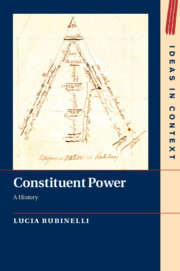Book contents
- Constituent Power
- Ideas in Context
- Constituent Power
- Copyright page
- Dedication
- Contents
- Acknowledgements
- Introduction
- Chapter 1 Sieyès and the French Revolution
- Chapter 2 Constitutional Politics in Nineteenth-Century France
- Chapter 3 The Weimar Republic
- Chapter 4 Constitutional Politics in Post–World War II Europe
- Chapter 5 Arendt and the French Revolution
- Conclusion
- Bibliography
- Index
- Ideas In Context
Chapter 2 - Constitutional Politics in Nineteenth-Century France
Published online by Cambridge University Press: 28 April 2020
- Constituent Power
- Ideas in Context
- Constituent Power
- Copyright page
- Dedication
- Contents
- Acknowledgements
- Introduction
- Chapter 1 Sieyès and the French Revolution
- Chapter 2 Constitutional Politics in Nineteenth-Century France
- Chapter 3 The Weimar Republic
- Chapter 4 Constitutional Politics in Post–World War II Europe
- Chapter 5 Arendt and the French Revolution
- Conclusion
- Bibliography
- Index
- Ideas In Context
Summary
In France, throughout the post-revolutionary period, sovereignty was invoked to justify unlimited, absolute and arbitrary exercises of power by the king, parliament and the people. These uses of sovereignty, I maintain, were perceived as politically dangerous by French jurists Jean Denis Lanjuinais, Firmin Laferrière, Felix Berriat Saint Prix and Edouard Laboulaye. On three different occasions, they resorted to constituent power to tame the implications of contemporary appeals to sovereignty. First, during the Restoration it was used to claim that the king could not exercise power unlimitedly, as the constituent power belonged to the people. Second, during the July Monarchy constituent power was used to oppose the Parliament’s claim to be the sovereign and the only legitimate author of the constitution. Last, during the Second Republic, constituent power was used to claim that the power of the republican sovereign amounted to and did not extend beyond authorising the creation of the legal system. Constituent power was thus used to negotiate an understanding of popular power different from that implicit in ideas of sovereignty. While sovereignty allowed for uncontrolled and unlimited exercise of power, pouvoir constituant was used to argue that the supreme authority consisted in the popular institution of the constitutional order.
- Type
- Chapter
- Information
- Constituent PowerA History, pp. 75 - 102Publisher: Cambridge University PressPrint publication year: 2020



